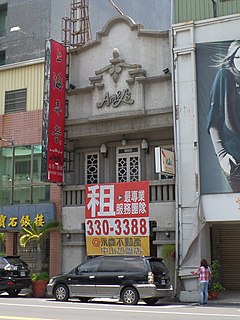
Renting, also known as hiring or letting, is an agreement where a payment is made for the temporary use of a good, service or property owned by another. A gross lease is when the tenant pays a flat rental amount and the landlord pays for all property charges regularly incurred by the ownership. An example of renting is equipment rental. Renting can be an example of the sharing economy.

A landlord is the owner of a house, apartment, condominium, land, or real estate which is rented or leased to an individual or business, who is called a tenant. When a juristic person is in this position, the term landlord is used. Other terms include lessor and owner. The term landlady may be used for the female owners. The manager of a pub in the United Kingdom, strictly speaking a licensed victualler, is referred to as the landlord/landlady. In political economy it refers to the owner of natural resources alone from which an economic rent is the income received.

Eviction is the removal of a tenant from rental property by the landlord. In some jurisdictions it may also involve the removal of persons from premises that were foreclosed by a mortgagee.

A lease is a contractual arrangement calling for the user to pay the owner for the use of an asset. Property, buildings and vehicles are common assets that are leased. Industrial or business equipment are also leased. Basically a lease agreement is a contract between two parties: the lessor and the lessee. The lessor is the legal owner of the asset, while the lessee obtains the right to use the asset in return for regular rental payments. The lessee also agrees to abide by various conditions regarding their use of the property or equipment. For example, a person leasing a car may agree to the condition that the car will only be used for personal use.
A leasehold estate is an ownership of a temporary right to hold land or property in which a lessee or a tenant holds rights of real property by some form of title from a lessor or landlord. Although a tenant does hold rights to real property, a leasehold estate is typically considered personal property.
A waiver is the voluntary relinquishment or surrender of some known right or privilege.
Key money is one of several forms of payment made to a landlord. The term has various meanings in different parts of the world. It sometimes means money paid to an existing tenant who assigns a lease to a new tenant where the rent is below market. It sometimes means a bribe to a landlord. In other parts of the world, it is used synonymously with normal security deposits, which are used to cover nonpayment of rent and excessive damage to a rental unit.
Property management is the operation, control, maintenance, and oversight of real estate and physical property. This can include residential, commercial, and land real estate. Management indicates the need of real estate to be cared for and monitored, with accountability for and attention to its useful life and condition considered. This is much akin to the role of management in any business.
A rental agreement is a contract of rental, usually written, between the owner of a property and a renter who desires to have temporary possession of the property; it is distinguished from a lease, which is more typically for a fixed term. As a minimum, the agreement identifies the parties, the property, the term of the rental, and the amount of rent for the term. The owner of the property may be referred to as the lessor and the renter as the lessee.
Dilapidation is a term meaning a destructive event to a building, but more particularly used in the plural in English law for
- the waste committed by the incumbent of an ecclesiastical living
- the disrepair for which a tenant is usually liable when he has agreed to give up his premises in good repair.
A slumlord is a slang term for a landlord, generally an absentee landlord with more than one property, who attempts to maximize profit by minimizing spending on property maintenance, often in deteriorating neighborhoods, and to tenants that they can intimidate. Severe housing shortages allow slumlords to charge higher rents, and when they can get away with it, to break rental laws.

In legal parlance, a peppercorn is a metaphor for a very small cash payment or other nominal consideration, used to satisfy the requirements for the creation of a legal contract. It is featured in Chappell & Co Ltd v Nestle Co Ltd, which stated that "a peppercorn does not cease to be good consideration if it is established that the promisee does not like pepper and will throw away the corn".
Leaseback, short for "sale-and-leaseback", is a financial transaction in which one sells an asset and leases it back for the long term; therefore, one continues to be able to use the asset but no longer owns it. The transaction is generally done for fixed assets, notably real estate, as well as for durable and capital goods such as airplanes and trains. The concept can also be applied by national governments to territorial assets; prior to the Falklands War, the government of the United Kingdom proposed a leaseback arrangement whereby the Falklands Islands would be transferred to Argentina, with a 99-year leaseback period, and a similar arrangement, also for 99 years, had been in place prior to the handover of Hong Kong to mainland China. Leaseback arrangements are usually employed because they confer financing, accounting or taxation benefits.
Rental value is the fair market value of property while rented out in a lease. More generally, it may be the consideration paid under the lease for the right to occupy, or the royalties or return received by a lessor (landlord) under a license to real property. In the science and art of appraisal, it is the amount that would be paid for rental of similar real property in the same condition and in the same area.

Landlord–tenant law is the field of law that deals with the rights and duties of landlords and tenants.
Lease audit is also referred to as Rent Audit, CAM Audit and Escalation Expense Audit. However, as the audit involves the inspection of other rights and obligations, names such as Lease Compliance Consulting and Lease Review are more appropriate.

Highway Properties Ltd v Kelly, Douglas and Co Ltd is a leading Canadian property law case concerning commercial landlord-tenant relationships decided by the Supreme Court of Canada.
For United States commercial real estate, normally the landlord, rather than the tenant, is responsible for real estate taxes, maintenance, and insurance. In a "net lease," in addition to base rent, the tenant or lessee is responsible for paying, some or all of the recoverable expenses related to real-estate ownership. As the rent collected under a net lease is "net" after expenses are passed through to tenants to be paid, the base rent tends to be lower than rent charged under a gross lease.

Rent regulation is a system of laws, administered by a court or a public authority, which aims to ensure the affordability of housing and tenancies on the rental market for dwellings. Generally, a system of rent regulation involves:

A retail lease is a legal document outlining the terms under which one party agrees to rent property from another party. A lease guarantees the lessee use of an asset and guarantees the lessor regular payments from the lessee for a specified number of months or years. Both the lessee and the lessor must uphold the terms of the contract for the lease to remain valid.
.







